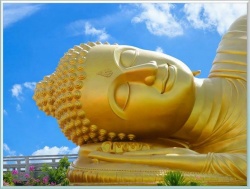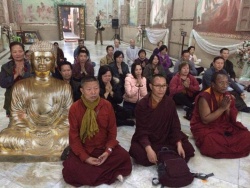Advice for Taking a Tantric Empowerment (Initiation)
As sentient beings, all of us have the working materials and potentials to attain the enlightened state of a Buddha.
We are all capable of understanding and knowing everything, being equally loving and compassionate to absolutely everyone, able to communicate with each of them perfectly and guide each of them skillfully to become liberated from their sufferings and to attain enlightenment.
In our present conditions, however, we are unable to realize those potentials.
Why is that so and how can we come to realize them?
Receiving a tantric empowerment (tantric initiation) is a step in that direction.
A “sentient being” is a living being whose actions are based on intention and who experiences the karmic consequences of those actions, either in this lifetime or in future lifetimes.
As sentient beings, however, we are “limited beings” in the sense that our minds, our hearts, our abilities to communicate effectively, our bodies, our actions, and so on are limited.
These are limited by our beginningless unawareness and confusion about behavioral cause and effect and about how we, others, and all phenomena exist.
Because of our “ignorance” of these basic facts of reality, we experience disturbing emotions (emotional afflictions).
Acting impulsively under their influence, we build up the karmic potentials that lead to our uncontrollably recurring rebirth (samsara).
In lifetime after lifetime, we experience difficulties, unhappiness, and the frustration that whatever happiness we have is short-lived and ultimately unsatisfying.
Even if we have the wish to help others, we have no idea of all the consequences of what we advise or teach them. We are reduced to merely guessing what would be of best help.
What are the basic working materials that we all have that will enable us to overcome these limitations?
We all have bodies, the ability to act, the ability to communicate, the ability to understand things, and the ability to have positive feelings toward others and to care for them.
Although all these abilities are limited now, they can be stimulated to grow.
This is because we all have some build-up of positive potential, so-called “merit.”
This is demonstrated by the fact that we presently have been born as human beings with the freedom and opportunity to develop ourselves further.
We also have some level of intelligence and understanding now; otherwise, we would be unable to know how to do anything. All these qualities are known collectively as our “Buddha-nature.”
They are our “evolving” Buddha-nature factors because they can grow to become unlimited in their abilities.
Also included in our Buddha-natures are “abiding” factors – factors that always stay the same and are the basis that allows for the development of our evolving factors.
These include the facts of the fundamental purity of our minds and the voidness (emptiness) of us as persons, and of our bodies, our minds, and everything.
Our minds are “pure” in the sense that by nature they are unstained by limiting factors; while “voidness” means the total absence of impossible ways of existing.
Our minds, for example, always have been and always will continue to be devoid of existing totally on their own, uninfluenced by anything, remaining forever in a limited state.
Such a manner of truly established existence (true existence) is impossible.
Because of the total absence, the voidness of that impossible manner of existence, and because of our mind’s fundamental purity and all our evolving Buddha-nature factors, we all are capable of removing our limitations forever and attaining enlightenment.
A tantric empowerment (initiation) is a ceremony for activating our evolving Buddha-nature factors, stimulating them to develop further, and planting further “seeds” of potential.
To receive that empowerment requires not only a fully qualified tantric master, but also us being properly prepared and receptive and our active participation in the proceedings. Proper preparation means first of all putting a safe direction in our lives (“taking refuge”).
This entails going in the safe direction indicated by the Buddhas, the Dharma, and the highly realized Arya Sangha.
Although the Dharma refers on the conventional level to the Buddhist teachings, on the deepest level it refers to what we attain through following those teachings.
We attain the state in which all our sufferings and their causes have been totally eradicated forever from our mental continuums and all the realizations that bring about and result from those states fill our minds instead.
The Buddhas are those who have in full on their mental continuums these true stoppings (true cessations) and these true pathways of mind (true understandings that lead to and result from these stoppings, “true paths.”)
The Arya Sangha are those who have them in part.
In addition to having this safe direction (refuge) in our lives, we also need a basic level of “renunciation.” This means a strong determination to be free from uncontrollably recurring rebirth.
Because we are determined to be free of this, we are willing to give up the true sufferings and true causes of those sufferings that cause our bodies and minds to be limited in each rebirth.
Further, to activate our Buddha-nature potentials, we need to have a basic level of a bodhichitta aim.
With this aim, we focus on our own state of enlightenment which has not happened yet, but which can happen on the basis of our Buddha-natures.
Our aim is to achieve this state and the reason for doing so is to best be able to help all others to gain liberation from their uncontrollably recurring rebirth and reach enlightenment.
Such an aim, then, is based on having equal love and compassion for everyone and taking universal responsibility to help them all.
In addition, we need a basic level of understanding of voidness – that we, others, samsara, liberation, enlightenment, all of these are “primordially” devoid of existing in impossible ways.
None of them exist in isolation, existing independently of everything else, including causes, effects, and conceptual categories used to discuss or think about them.
We also need a basic understanding of how the practice of tantra will bring us to enlightenment and confidence in its methods and in our tantric master’s ability to guide us through these methods.
During an empowerment into the highest class of tantra, for example Kalachakra, we take bodhisattva and tantric vows.
The bodhisattva vows are to avoid behavior that would hamper us from being of best help to others.
Tantric vows are to avoid behavior and ways of thinking that would hinder our success in the tantric practice.
In order to receive these vows, we must consciously accept them with the full intention to try our best to keep them all the way to our attainment of enlightenment.
The basis for the ability to keep them is our training in ethical self-discipline gained through keeping some level of vows for individual liberation (pratimoksha vows),
for instance lay vows to refrain from killing, stealing, lying, taking intoxicants, and indulging in sexual behavior inappropriate for gaining liberation.
The empowerment ritual contains many parts, each of which entails complex visualizations of our tantric master as a Buddha-figure (yidam), our environment as the mandala palace and grounds of that figure,
and ourselves as various Buddha-figures representing our own future enlightened state that we are aiming to achieve with bodhichitta.
Even if we cannot visualize these clearly, we need at least to feel that our tantric master, our surroundings and we are in these pure forms.
At each stage of the empowerment, we also need to imagine that we are experiencing a blissful state of mind focused on voidness.
Although we may not be able to do this very well, we need at least to think that none of what is happening exists independently of having causes, effects, parts, and being what the words and concepts for them refer to.
When we remind ourselves of this fact of their voidness, we need to feel happy that this is the case.
This conscious experience of blissful awareness of voidness is what actually activates our evolving Buddha-nature factors, stimulates them to grow further, and plants more “seeds” of potential.
Therefore, we need to try our best to generate such a state of mind.
In this way, we will actually receive the empowerment, rather than merely witnessing it.







